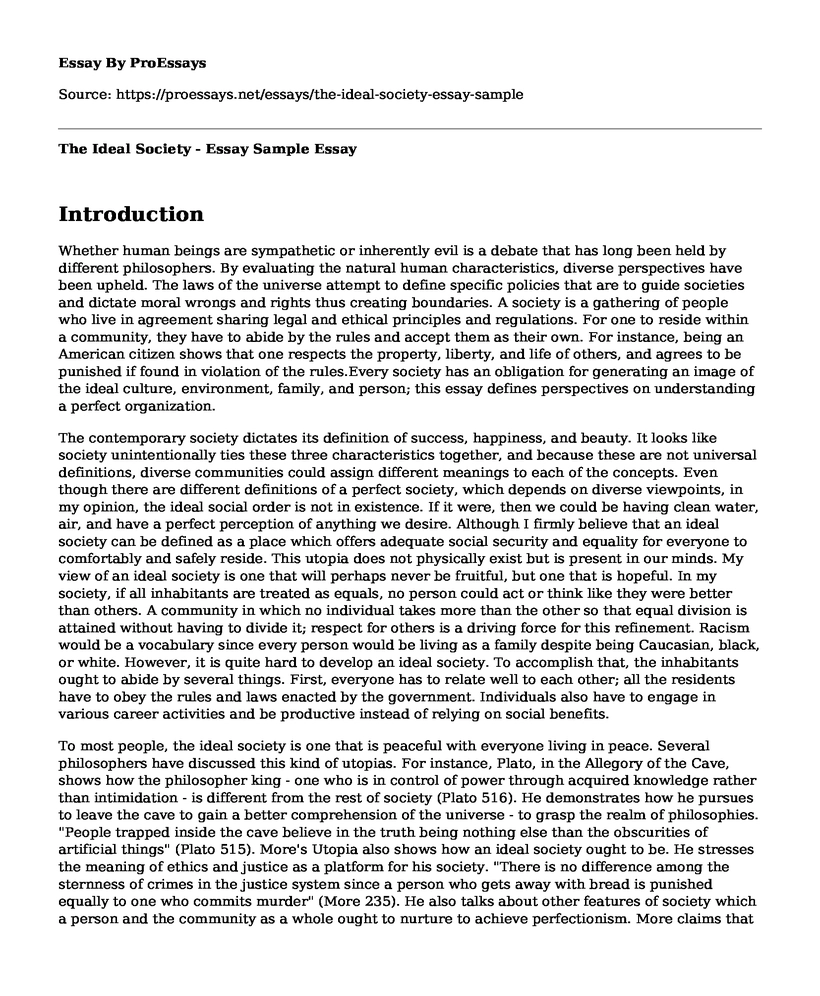Introduction
Whether human beings are sympathetic or inherently evil is a debate that has long been held by different philosophers. By evaluating the natural human characteristics, diverse perspectives have been upheld. The laws of the universe attempt to define specific policies that are to guide societies and dictate moral wrongs and rights thus creating boundaries. A society is a gathering of people who live in agreement sharing legal and ethical principles and regulations. For one to reside within a community, they have to abide by the rules and accept them as their own. For instance, being an American citizen shows that one respects the property, liberty, and life of others, and agrees to be punished if found in violation of the rules.Every society has an obligation for generating an image of the ideal culture, environment, family, and person; this essay defines perspectives on understanding a perfect organization.
The contemporary society dictates its definition of success, happiness, and beauty. It looks like society unintentionally ties these three characteristics together, and because these are not universal definitions, diverse communities could assign different meanings to each of the concepts. Even though there are different definitions of a perfect society, which depends on diverse viewpoints, in my opinion, the ideal social order is not in existence. If it were, then we could be having clean water, air, and have a perfect perception of anything we desire. Although I firmly believe that an ideal society can be defined as a place which offers adequate social security and equality for everyone to comfortably and safely reside. This utopia does not physically exist but is present in our minds. My view of an ideal society is one that will perhaps never be fruitful, but one that is hopeful. In my society, if all inhabitants are treated as equals, no person could act or think like they were better than others. A community in which no individual takes more than the other so that equal division is attained without having to divide it; respect for others is a driving force for this refinement. Racism would be a vocabulary since every person would be living as a family despite being Caucasian, black, or white. However, it is quite hard to develop an ideal society. To accomplish that, the inhabitants ought to abide by several things. First, everyone has to relate well to each other; all the residents have to obey the rules and laws enacted by the government. Individuals also have to engage in various career activities and be productive instead of relying on social benefits.
To most people, the ideal society is one that is peaceful with everyone living in peace. Several philosophers have discussed this kind of utopias. For instance, Plato, in the Allegory of the Cave, shows how the philosopher king - one who is in control of power through acquired knowledge rather than intimidation - is different from the rest of society (Plato 516). He demonstrates how he pursues to leave the cave to gain a better comprehension of the universe - to grasp the realm of philosophies. "People trapped inside the cave believe in the truth being nothing else than the obscurities of artificial things" (Plato 515). More's Utopia also shows how an ideal society ought to be. He stresses the meaning of ethics and justice as a platform for his society. "There is no difference among the sternness of crimes in the justice system since a person who gets away with bread is punished equally to one who commits murder" (More 235). He also talks about other features of society which a person and the community as a whole ought to nurture to achieve perfectionism. More claims that his nation is a socialist state where the people are given obligations to fulfill (More 238). In return, the government offers them provisions. In this way, the state leader does not exercise power on the people. Instead, he is obliged to them. We can with no doubt learn from the books talking about perfect social order and find out that no matter how a community is structured, a disagreement always has to come up to some certain extent in culture. Therefore, there is nothing like having an ideal society.
Conclusion
Concludingly, concepts of the human mind and the realities of the world ought to live in peace for a utopian society to be fruitful. Equality, reverence, and knowledge are essential elements in ideal social order. In a perfect community, these facets combine to enable every person to exist in tranquillity. I understand that this is a farfetched society, but if situations stood flawlessly, then the social order could be ideal. It is much to seek that people eradicate selfishness and greed, but then if this is achieved, then the community might be closer to being ideal. Nothing could ever go wrong in such a society, and in case it did; then it would cease being ideal. Utopia seems like it might be before us, but regrettably, it is nowhere to be seen.
Works Cited
More, Thomas. "L'utopie." Moreana 43.2-3 (2006): 227-240.
Plato, C. "Allegory of the Cave."The Republic. Readings in The Economics of The Division of Labor: The Classical Tradition. 2005. 514-517.
Cite this page
The Ideal Society - Essay Sample. (2022, Jun 13). Retrieved from https://proessays.net/essays/the-ideal-society-essay-sample
If you are the original author of this essay and no longer wish to have it published on the ProEssays website, please click below to request its removal:
- Ethical Issues in Counseling Essay
- Paper Example on Deviance: Normal or Pathological
- Racial Labels Throughout History Paper Example
- Essay Example on Social Media: Unlocking Effective Communication for Business Growth
- Annotated Bibliography: Gender, Family, & Marital Satisfaction in Korea
- TV Violence: Impact on Society and Ways to Reduce It - Essay Sample
- Essay Example on Fairness & Equity in a Competitive Sphere: A Philosophical Conundrum







